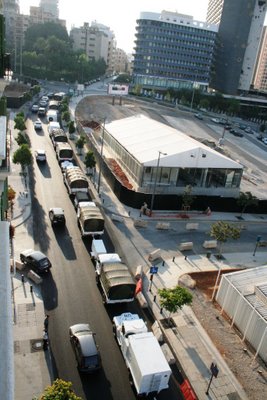UN Deployment
 This weekend French troops under the UN banner have begun heading towards south of Lebanon (as depicted in above picture taken on Saturday16th Sept.)
This weekend French troops under the UN banner have begun heading towards south of Lebanon (as depicted in above picture taken on Saturday16th Sept.)Lieutenant Colonel Jerome Salle said the troops will move first to Deir Kifa, east of the southern port of Tyre, before eventually relieving a Ghanaian contingent in Bint Jbeil. They will join hundreds of Italians, Spanish, Indians and Ghanaians and other French already deployed in the area.The battalion, which will be supported by around a dozen Leclerc tanks, will have two roles -- to control the area around Bint Jbeil and to act as a rapid-reaction force.
According to the United Nations Interim Force in Lebanon (UNIFIL), around two-thirds of the French troops will be based in Baraashit, in the hills above Bint Jbeil, which saw some of the heaviest fighting in the 34-day war that ended in a UN-brokered truce on August 14. At the headquarters of the 28-year-old UNIFIL, in the southwest coastal village of Naqoura, troops already settling in erected an 8-meter (25 foot) model of the Eiffel Tower -- a memory of home.
Many French troops said they feel welcomed, with all sides encouraging their presence. But they are well aware of the potential danger they face in working to keep the peace."We're ready for any eventuality, but of course it could inflame again at any time," said Lt. Eric Lemee, a Foreign Legion officer from Brittany in western France. "If we have to raise our level of alert, we'll do it."
The French will be deploying with haunting memories of the October 23, 1983 suicide bomb attacks on barracks in Beirut that killed 58 French peacekeepers and 241 American servicemen and led to the withdrawal of the international peacekeeping force in Lebanon. France initially hesitated to commit its troops in large numbers to Lebanon and said it would only send an additional 200 soldiers to reinforce its 200-strong contingent in the existing UNIFIL force.
But a week later under heavy international pressure, and after Italy put France to shame by announcing it would send 3,000 troops, Chirac did an about-face and said that 2,000 French troops would serve in Lebanon. Now, France is at the forefront of the foreign efforts to preserve a cease-fire that went into effect after 34 days of fighting between Hizbullah and Israel. Besides its ground forces, it has 1,700 naval personnel that are helping to patrol the waters off Lebanon's shores.
Chirac has pressed for tough rules of engagement for the enhanced U.N. force, and has scored political points at home, winning the backing of an array of political parties for the expansion of the French role. In an effort to deter any aggression, French forces have at their disposal Leclerc tanks, sophisticated Cobra radar systems and 155 mm artillery cannons. Nonetheless Chirac last week told Spanish Prime Minister Jose Luis Rodriguez Zapatero he was "a bit worried" that situation in Lebanon could deteriorate in the coming months. Israeli aircraft have repeatedly made over flights, while Hizbullah is believed to have hidden weapons. In Bint Jbeil, a Hizbullah stronghold where the French are to center their operations, the group's yellow banners proclaim "Our blood has won" in French and English. There are concerns about the risks of a terrorist attack on French forces. A top French anti-terrorism official, Christophe Chaboud, has said that his country's decision to participate in the U.N. force on such a scale "could be exploited from outside and used as a pretext" for reprisals.
In Lebanon, "anything can happen" in the aftermath of the conflict and "in particular concerning the especially difficult issue of Hizbullah's demilitarization," he said in an interview with French daily Liberation this week. An additional 170 French troops arrived on Saturday, and a second French battalion is to arrive in Lebanon in the coming weeks.

0 Comments:
Post a Comment
<< Home